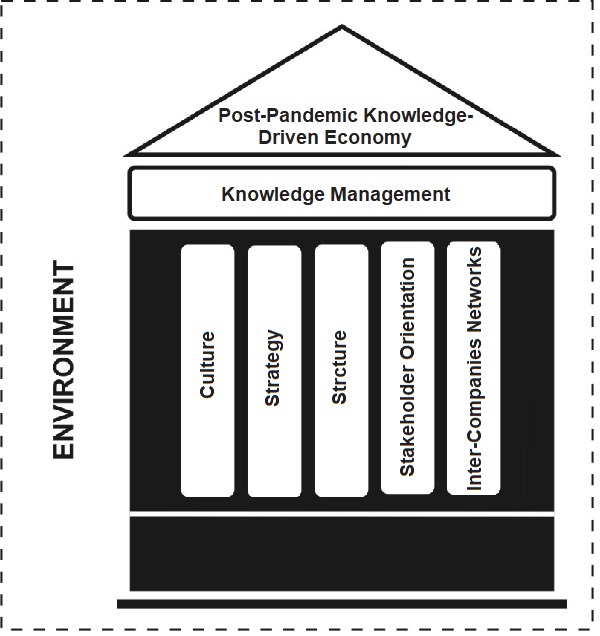
A director of Operational Risk Management at a prominent large organization mentioned that organizations that can manifest information and distribute it timely and effectively throughout the organization by creating a model that is both efficient and effective would provide a platform for competitive advantage that will be tantamount to the industry and used worldwide for years to follow. This has been manifested by using organizational internal resources that have manifested technical and knowledge-based support systems.
Post-Pandemic Knowledge Management Framework
The following figure presents my overall framework that constitutes the conceptual model expressed throughout this paper. The figure is indicative of the impact of organizational internal resources. This framework portrays how organizational internal resources impact knowledge management.

This context is a new extrapolation of current research in knowledge management development and can offer a new appellation on managerial implications.
Knowledge Management Research
Through training executives in San Diego and also in Sydney, Australia, I found that too much structure had a negative impact on knowledge management while networks, stakeholders, strategic management implementation, and culture have proven to, at least anecdotally, have positive results on knowledge management. Thus, in training and developing executives in leadership development sessions, I found that leaders using knowledge management techniques attempt to implement and create sustainable change efforts. This focus-group study is captured below and is based on the following factors:
- Continuing to measure the engagement of followers every quarter, not just every year which is currently the norm
- Creating action plans with a steering committee that involves key players throughout the organization
- Executives should meet with CEOs as often as possible to discuss current business practices, risk management, knowledge gathering, knowledge storing, and, most importantly, knowledge dissemination
- Encourage knowledge management as an annual employee focus group meeting to share ideas and make adjustments and improvements
- Develop knowledge management systems to hardwire change initiatives and disseminate this information throughout the organization to remain current and up to date on technology platforms throughout not only the organization but the industry-wide
- Have followers along with leaders participate in incentive-wide activities and committees that help both internal and external strategic objectives to develop and formulate strategic objective implementation
- Cut out unnecessary meetings: Create meaningful staff meetings with pre-supposed agenda items and deliverables implemented at the end of the meetings with follow-up when the next meeting begins. Open the next meetings addressing the last meeting deliverables and how they have been met or are being worked upon.
- Define follower space and ramp up accountability to ensure profitable pursuits in an ethical and honest manner, improve follower and employee performance, and enhance employee satisfaction throughout the organization.
Based upon my contextual framework and derived model, in which I emphasize one well-researched topic, knowledge management, I propose scenarios in which organizational internal resources intersect and are based upon my suggested link. In the post-pandemic, all this has changed. I provide possible causal relationships that may lead to higher knowledge management development——from a financial viewpoint and from a higher employee satisfaction contingent and from the recovery from a pandemic.
I argue that executives may be able to improve knowledge management performance. For example, while we see an enhanced use of the most modern knowledge management techniques, I also realize that this important facet of organizational performance is affected by various internal characteristics of organizations, such as the structure of the organization, the culture of the organization, the strategic planning of the organization, and the internal and external network. Most importantly, the stakeholders strongly influence executive decision-making, and company performance pertains directly to them.
Conclusion
This article presents a framework that may guide future studies in management and organizational behavior. I reveal a lack of empirical support to measure how the dimensions of knowledge management development are facilitated with the better use of organizational internal resources. Thus, this paper is brought forth with the intention of a much more advanced empirical study, which is now in its final stages. The post-pandemic needs both psychological and empirical research to engage the mind of followers worldwide coupled with leadership decision-making as the world recovers from a year setback that began in March 2020 and still exists today.
In the knowledge economy, only the knowledgeable will survive. As I continue my research in this area, I welcome my colleagues to use this article to further the development of knowledge management.




